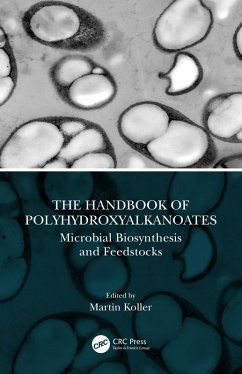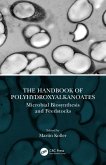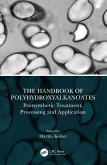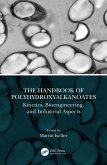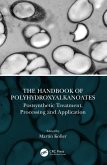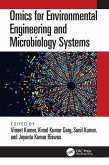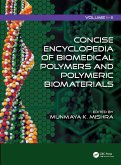The Handbook of Polyhydroxyalkanoates (eBook, ePUB)
Microbial Biosynthesis and Feedstocks
Redaktion: Koller, Martin
63,95 €
63,95 €
inkl. MwSt.
Sofort per Download lieferbar

32 °P sammeln
63,95 €
Als Download kaufen

63,95 €
inkl. MwSt.
Sofort per Download lieferbar

32 °P sammeln
Jetzt verschenken
Alle Infos zum eBook verschenken
63,95 €
inkl. MwSt.
Sofort per Download lieferbar
Alle Infos zum eBook verschenken

32 °P sammeln
The Handbook of Polyhydroxyalkanoates (eBook, ePUB)
Microbial Biosynthesis and Feedstocks
Redaktion: Koller, Martin
- Format: ePub
- Merkliste
- Auf die Merkliste
- Bewerten Bewerten
- Teilen
- Produkt teilen
- Produkterinnerung
- Produkterinnerung

Bitte loggen Sie sich zunächst in Ihr Kundenkonto ein oder registrieren Sie sich bei
bücher.de, um das eBook-Abo tolino select nutzen zu können.
Hier können Sie sich einloggen
Hier können Sie sich einloggen
Sie sind bereits eingeloggt. Klicken Sie auf 2. tolino select Abo, um fortzufahren.

Bitte loggen Sie sich zunächst in Ihr Kundenkonto ein oder registrieren Sie sich bei bücher.de, um das eBook-Abo tolino select nutzen zu können.
This volume focuses on feedstock aspects, enzymology, metabolism and genetic engineering of PHA biosynthesis and covers mechanisms of PHA biosynthesis, enhancement of PHA biosynthesis in bio-technological and microstructure terms and performance enhancement of PHAs over established petrol-based plastics on industrial scale.
- Geräte: eReader
- ohne Kopierschutz
- eBook Hilfe
- Größe: 12.57MB
Andere Kunden interessierten sich auch für
![The Handbook of Polyhydroxyalkanoates (eBook, PDF) The Handbook of Polyhydroxyalkanoates (eBook, PDF)]() The Handbook of Polyhydroxyalkanoates (eBook, PDF)63,95 €
The Handbook of Polyhydroxyalkanoates (eBook, PDF)63,95 €![The Handbook of Polyhydroxyalkanoates (eBook, ePUB) The Handbook of Polyhydroxyalkanoates (eBook, ePUB)]() The Handbook of Polyhydroxyalkanoates (eBook, ePUB)63,95 €
The Handbook of Polyhydroxyalkanoates (eBook, ePUB)63,95 €![The Handbook of Polyhydroxyalkanoates (eBook, ePUB) The Handbook of Polyhydroxyalkanoates (eBook, ePUB)]() The Handbook of Polyhydroxyalkanoates (eBook, ePUB)63,95 €
The Handbook of Polyhydroxyalkanoates (eBook, ePUB)63,95 €![The Handbook of Polyhydroxyalkanoates (eBook, PDF) The Handbook of Polyhydroxyalkanoates (eBook, PDF)]() The Handbook of Polyhydroxyalkanoates (eBook, PDF)63,95 €
The Handbook of Polyhydroxyalkanoates (eBook, PDF)63,95 €![Dressings for Advanced Wound Care (eBook, ePUB) Dressings for Advanced Wound Care (eBook, ePUB)]() Sharon Lam Po TangDressings for Advanced Wound Care (eBook, ePUB)88,95 €
Sharon Lam Po TangDressings for Advanced Wound Care (eBook, ePUB)88,95 €![Omics for Environmental Engineering and Microbiology Systems (eBook, ePUB) Omics for Environmental Engineering and Microbiology Systems (eBook, ePUB)]() Omics for Environmental Engineering and Microbiology Systems (eBook, ePUB)78,95 €
Omics for Environmental Engineering and Microbiology Systems (eBook, ePUB)78,95 €![Concise Encyclopedia of Biomedical Polymers and Polymeric Biomaterials (eBook, ePUB) Concise Encyclopedia of Biomedical Polymers and Polymeric Biomaterials (eBook, ePUB)]() Concise Encyclopedia of Biomedical Polymers and Polymeric Biomaterials (eBook, ePUB)290,95 €
Concise Encyclopedia of Biomedical Polymers and Polymeric Biomaterials (eBook, ePUB)290,95 €-
-
-
This volume focuses on feedstock aspects, enzymology, metabolism and genetic engineering of PHA biosynthesis and covers mechanisms of PHA biosynthesis, enhancement of PHA biosynthesis in bio-technological and microstructure terms and performance enhancement of PHAs over established petrol-based plastics on industrial scale.
Dieser Download kann aus rechtlichen Gründen nur mit Rechnungsadresse in A, B, BG, CY, CZ, D, DK, EW, E, FIN, F, GR, HR, H, IRL, I, LT, L, LR, M, NL, PL, P, R, S, SLO, SK ausgeliefert werden.
Produktdetails
- Produktdetails
- Verlag: Taylor & Francis eBooks
- Seitenzahl: 452
- Erscheinungstermin: 5. November 2020
- Englisch
- ISBN-13: 9781000173659
- Artikelnr.: 60146386
- Verlag: Taylor & Francis eBooks
- Seitenzahl: 452
- Erscheinungstermin: 5. November 2020
- Englisch
- ISBN-13: 9781000173659
- Artikelnr.: 60146386
- Herstellerkennzeichnung Die Herstellerinformationen sind derzeit nicht verfügbar.
Martin Koller was awarded his PhD degree by Graz University of Technology, Austria, for his thesis on polyhydroxyalkanoate (PHA) production from dairy surplus streams which was enabled by the EU-project WHEYPOL ("Dairy industry waste as source for sustainable polymeric material production"), supervised by Gerhart Braunegg, one of the most eminent PHA pioneers. As senior researcher, he worked on bio-mediated PHA production, encompassing development of continuous and discontinuous fermentation processes, and novel downstream processing techniques for sustainable PHA recovery. His research focused on cost-efficient PHA production from surplus materials by bacteria and haloarchaea and, to a minor extent, to the development for PHA for biomedical use. He currently holds more than 70 Web-of-science listed articles in high ranked scientific journals (h-index 23), authored twelve chapters in scientific books, edited three scientific books and four journal special issues on PHA, gave plenty of invited and plenary lectures at scientific conferences, and supports the editorial teams of several distinguished journals. Moreover, Martin Koller coordinated the EU-FP7 project ANIMPOL ("Biotechnological conversion of carbon containing wastes for eco-efficient production of high added value products"), which, in close cooperation between academia and industry, investigated the conversion of animal processing industry¿s waste streams towards structurally diversified PHA and follow-up products. In addition to PHA exploration, he was also active in microalgal research and in biotechnological production of various marketable compounds from renewables by yeasts, chlorophyte, bacteria, archaea, fungi or lactobacilli. At the moment, Martin Koller is active as research manager and external supervisor for PHA-related projects.
1. Monomer-Supplying Enzymes for Polyhydroxyalkanoate Biosynthesis. 2. PHA Granule-Associated Proteins and their Diverse Functions. 3. Genomics of PHA Synthesizing Bacteria. 4. Molecular Basis of Medium-Chain Length-PHA Metabolism of Pseudomonas putida. 5. Production of Polyhydroxyalkanoates by Paraburkholderia and Burkholderia species: A Journey from the Genes through Metabolic Routes to their Biotechnological Applications. 6. Genetic Engineering as a Tool for Enhanced PHA Biosynthesis from Inexpensive Substrates. 7. Biosynthesis and Sequence Control of scl-PHA and mcl-PHA. 8. Inexpensive and Waste Raw Materials for PHA Production. 9. Sustainable Production of Polyhydroxyalkanoates from Crude Glycerol. 10. Biosynthesis of Polyhydroxyalkanoates (PHA) from Vegetable Oils and its By-products by Wild-Type and Recombinant Microbes. 11. Production and Modification of PHA Polymers Produced from Long-Chain Fatty Acid. 12. Converting Petrochemical Plastic to Biodegradable Plastic. 13. Comparing Heterotrophic with Phototrophic PHA Production - Concurring or Complementing Strategies?. 14. Coupling Biogas (CH4) with PHA Biosynthesis. 15. Syngas as a Sustainable Carbon Source for PHA Production.
1. Monomer-Supplying Enzymes for Polyhydroxyalkanoate Biosynthesis. 2. PHA Granule-Associated Proteins and their Diverse Functions. 3. Genomics of PHA Synthesizing Bacteria. 4. Molecular Basis of Medium-Chain Length-PHA Metabolism of Pseudomonas putida. 5. Production of Polyhydroxyalkanoates by Paraburkholderia and Burkholderia species: A Journey from the Genes through Metabolic Routes to their Biotechnological Applications. 6. Genetic Engineering as a Tool for Enhanced PHA Biosynthesis from Inexpensive Substrates. 7. Biosynthesis and Sequence Control of scl-PHA and mcl-PHA. 8. Inexpensive and Waste Raw Materials for PHA Production. 9. Sustainable Production of Polyhydroxyalkanoates from Crude Glycerol. 10. Biosynthesis of Polyhydroxyalkanoates (PHA) from Vegetable Oils and its By-products by Wild-Type and Recombinant Microbes. 11. Production and Modification of PHA Polymers Produced from Long-Chain Fatty Acid. 12. Converting Petrochemical Plastic to Biodegradable Plastic. 13. Comparing Heterotrophic with Phototrophic PHA Production - Concurring or Complementing Strategies?. 14. Coupling Biogas (CH4) with PHA Biosynthesis. 15. Syngas as a Sustainable Carbon Source for PHA Production.
